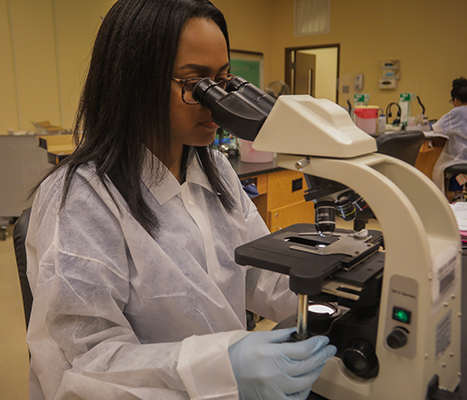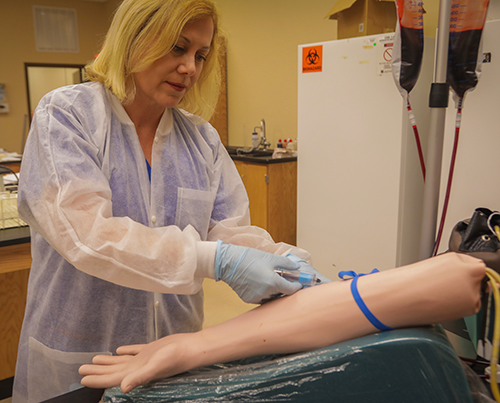Header Two
Medical Laboratory Technician Frequently Asked Questions
The Delgado MLT Program is an Allied Health Program that is accredited by the National Accrediting Agency for Clinical Laboratory Sciences, 5600 N River Rd, Suite 720, Rosemont, IL 60018, (773) 714-8880.
Graduates of the program receive an Associate of Applied Science Degree.
What is Medical Technology?
Medical Technology is the field of health care that performs clinical laboratory tests using microscopes, computers and instruments on body fluids and tissues to help the physician detect, diagnose, treat and prevent diseases.
What is a Medical Laboratory Technician?
A medical laboratory technician performs general clinical laboratory tests in all areas of the clinical laboratory. A MLT may analyze the chemical content of body fluids including blood, urine and spinal fluid to detect infectious organisms, cancer, and blood typing. They act as scientific investigators tracking down clues of possible diseases.
What is the MLT Program like at Delgado?
The MLT Program consists of two years of combined general education, required related courses, and the professional MLT courses. The MLTS component of the program begins in January of each year and consists of TWENTY-FOUR MONTHS OF DAYTIME class work and clinical experiences.
 How do you apply for admission to the MLT Program?
How do you apply for admission to the MLT Program?
Delgado Community College is an open admissions college; however acceptance into the MLTS Program is by selection. The Admissions Committee for the MLT Program reviews and evaluates each application on an impartial basis. Meeting the minimum requirements does not guarantee admission into the program. Students wishing to apply for admission to the MLT Program must submit a completed MLTS application to the Division of Allied Health no later than October 1.
Persons accepted into the MLT Program will be required to meet the technical standards of the MLT profession which are available for review in the Allied Health Admissions Office.
NOTE: You are strongly advised to see an Allied Health Admissions Advisor to review your transcripts at least one semester prior to applying to the program.
When should you apply for admission to the MLT Program?
Students are eligible for admission to the MLT program who:
- Possess a high school diploma or equivalent.
- Successfully complete pre-requisite courses: BIOL 161 AND 163, ENGL 101 AND Math 120.
- Possess a cumulative grade point average of at least 2.0 in all college courses.
NOTE: Science courses over 7 years old may require repetition. Check with the Allied Health Admissions Advisor.
What are the career opportunities for a Medical Laboratory Technician?
The majority of MLTs work in the hospital laboratory. Other places of employment are clinics, doctor's offices, blood banks, research and commercial laboratories. Starting MLT graduates salaries range from $18.00 to $22.00 per hour.
Will MLT courses transfer to a MT Program?
For a medical laboratory technician to become a medical technologist, the MLT must have a baccalaureate degree and either three years of general laboratory experience or attend an accredited medical technology program.
How do you find out if courses you have taken at other schools will transfer to Delgado?
To find out if courses you have taken will transfer to Delgado, call (504) 671-6203 for information on meeting with an Allied Health Admissions Advisor to have your transcripts evaluated.
Essential Functions for the Medical Laboratory Technician
The Delgado MLT Program has established technical standards that must be met by the
students in the program. Overall the student must be in good physical health and free
from contagious diseases and addictions.
A. Motor Skills – Students must be able to:
- Work for extended periods of time in small spaces, when needed
- Manipulate and handle laboratory equipment
- Utilize keyboard for inputting data
- Perform venipunctures at the patient’s bedside or in an outpatient area
 B. Visual Ability – Students must be able to:
B. Visual Ability – Students must be able to:
- Differentiate color changes
- Read computer screens, lab instruments and procedure manuals
- Use a clinical grade binocular microscope to discriminate and recognize fine differences in structure and color of microscopic specimens
- Detect and recognize alarms from instruments and equipment
C. Communication Skills – Students must be able to:
- Communicate with individuals and groups(i.e. faculty members, staff, patients, and other health care professionals) verbally and in recorded format (unaided oral speech, writing, typing, and graphics)
- Understand and interpret written and verbal instructions D.
Mental Ability – Students must be able to:
- Use good judgment in performing laboratory procedures and validating test results
- Recognize safety hazards
- Manage use of time in order to complete tasks within specific time constraints
E. Human Relations – Students must be able to:
- Work compatibly with other technicians/ technologists as a team member
- Interact with patients in a concerned and compassionate manner
- Respond positively to supervision and accept suggestions
- Interact with hospital personnel and physicians professionally
F. Behavioral Skills – A student must possess adequate behavioral skills to be able to
- Be honest, compassionate, ethical and responsible. The student must be forthright about errors and uncertainty. Student must be able to critically evaluate his/her own performance, accept constructive criticism and look for ways to improve.
- Show respect for individuals of different age, race, religion, and/or sexual orientation
- Be flexible and able to adapt to change
- Provide professional and technical services while experiencing the stresses of a distracting environment (i.e.high noise level, crowding, complex visual stimuli) and emergent demands (i.e. STAT tests, ringing phones)
- Exhibit professional behavior by conforming to appropriate standards of dress, appearance, language and public behavior. For example, body piercing and visible tattoos are NOT considered professional appearance.
